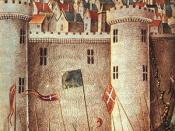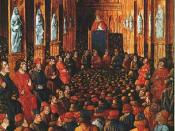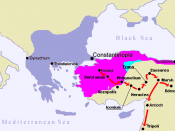The Noble Crusaders
Who were the Crusaders? This is a question that is brought up frequently because the Crusades are a very interesting and important topic. The Crusaders were a band of men fighting for their religion and their freedom. When you became a crusader, it meant taking up your cross (Lyon 926). These men fought many bloody battles and trampled many lands. The real reason that they were fighting was to recapture the Holy Land, which had been taken by the Muslims. The Crusaders are an important topic, and hopefully this fundamental pilgrimage will be exhilarating enough.
The first and foremost supporter of the Crusades was the Emperor, Alexius Comnenus. This esteemed man quickly went to the Pope and asked him for help. Alexius was a very brave man, and he did many things for his people. The pope at this time was a respected man, Urban II.
When Urban II was asked to start a religious band of warriors, he could just not turn this idea down. Urban II started talking about fighting for their freedom of faith, and he had many cheerful followers by 1096.
How did the Crusades begin in the first place? In the year 1090, the Emperor of Rome, Alexius Comnenus, asked Pope Urban II if he would help him embark on the First Crusade. Urban thought that this was an excellent idea, and he started spreading the word about this. In 1095 Urban II called a great council, and this meeting was called the Council of Clermont. Moving a large amount of people, the Pope preached to a great multitude about the crusades, and it is stated that many people in the street started to shout, "God wills it" (Lyon 926). After this the First Crusade began in 1096. Finally, the First...



A one-sided account of the Crusades
The above essay glorifies the Crusaders and entirely assumes that their motives for the Crusades were puritanical and religious. This may be because the writer used Western Historians, who recount history based on the "chronica" which were a series of accounts tabulated by Christian Europeans in those days.
According to sources from the Muslim world, as well as a few sources from the Western world, the Crusades started off with the premise of recapturing the Holy Land from the Muslims and fighting for their Religion, but what actually happened during the battles was quite different.
The Crusaders pillaged cities and villages on their way to Jerusalem, and killed many innocent peasants and civilians, including Jews and Christians living in those cities.
Jews and Christians and Muslims lived in tolerance of each other in the Holy Land before the Crusaders attempted to recapture it. When Umar Ibn Al KHatab took Jerusalem in the 6th century, he assured the inhabitants that they would be allowed religious freedom and tolerance to practice their faith as they chose.
Now contrast this with when the Crusaders entered Jerusalem. They slaughtered Jewish people in their Synagoge, killed masses or Armenian, Syrian and Greek Jews in the Church of the Holy Sepulcher, and desecrated Muslims. In fact, whenever the Crusaders were successful in a battle and conquered a city or village, they divided up the spoils of war amongst themselves after killing/enslaving those inhabitants of the city regardless of their faith. In that time, according to many sources and reliable accounts, many Christian Greeks and Turks, who lived with the Muslim Turks and Arabs in cities such as Ma'arah and Tripoli, actually worked as spys for their Muslim leaders because in that region, people were not grouped by their religion, but by their national allegiance. On the other hand, many Muslim Turks were recruited as mercenaries for the Imperial Army which shows you that the Asian region did not view this as a Holy War, but rather as an invasion of their land. They didn't understand the motive behind the Crusades, and instead called the Crusades the "Frankish Invasions", owing to the fact that many of the Crusaders were Western European, which was termed Frankish in Arabic.
Nevertheless, this essay does make some valid factual points such as the fact that the Crusades did enable trade of information and wealth, as well as culture and intellect. Also, the historical account of how the Crusades were instigated is also very correct and thorough. Thank you for this essay.
0 out of 0 people found this comment useful.